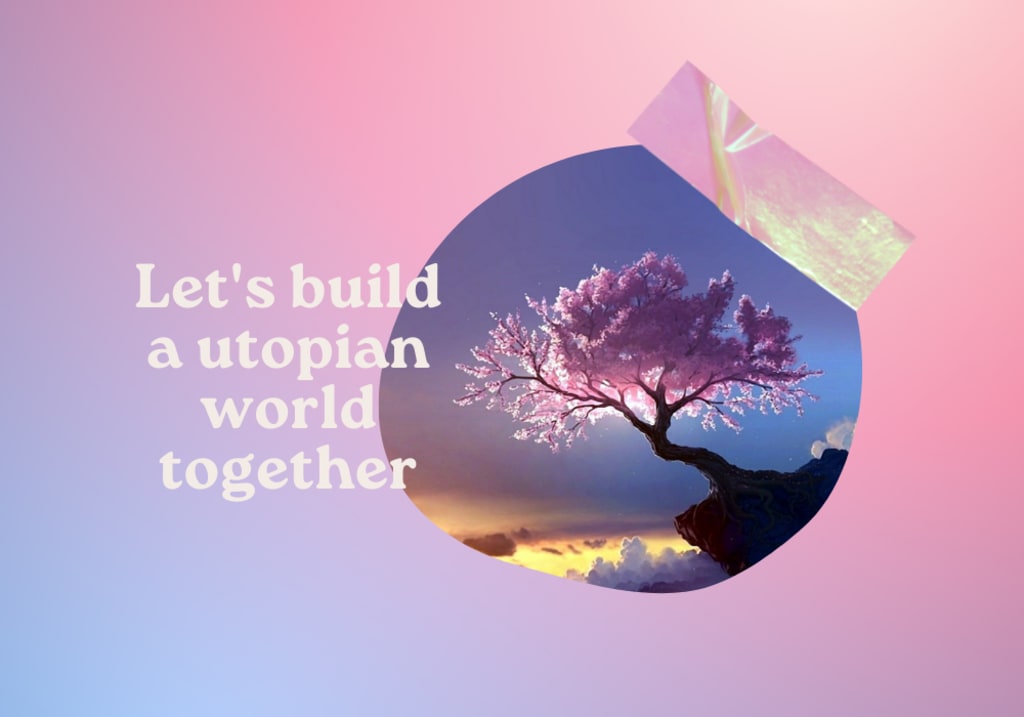What if I write a fantasy series in public?
And build a community of readers while I'm writing it.

The sci-fi series Foundation inspired Elon Musk to launch SpaceX. Jules Verne’s Twenty Thousand Leagues Under the Sea inspired Simon Lake to invent the submarine. Verne’s Clipper of the Clouds inspired Igor Sikorsky to invent the helicopter. Mary Shelley’s use of electricity to rouse Frankenstein’s monster inspired the invention of the defibrillator.
For as long as we can remember, science fiction writers have imagined what might be possible, and technologists have set out to build it. The problem is all of our novels are dystopian now—imagining a future plagued by climate catastrophe and AI apocalypse. If even our most imaginative minds can’t imagine a better future for humanity, how are we supposed to create it?
That’s why I want to write a utopian novel. Well that, and I want to spend my time writing something serene—to sink into a fantasy world of my own making and breathe beautiful thoughts onto the page on a daily basis.
Still, I’m not anxious to do the same thing I did last time: I don’t want to spend years in solitude writing a novel that might never get read. So this time I wonder whether it’s possible to build a community of readers first… and then write for it.
And I have some ideas about how I might do that.
Tapping into existing communities
When they graduated high school in 1986, the Oliver twins wanted to make video games—but that wasn’t the most lucrative of career choices so their dad struck them a deal: If they could make more money in one year than he did as a naval engineer and nuclear-submarine designer, they could keep making games. If not, back to school.
“For the first time, we started to look at this like it might be a business,” one of the brothers, Philip, told Delayed Gratification. “So we went to WH Smith and started looking at what was selling. Often, games were successful just because they had a good cover or were linked to something in the cultural ether. We thought Ghostbusters was a rubbish game at the time, but people bought it because they liked the film.”
Very quickly the brothers realized that if they wanted their first game to sell, they didn’t have time to build a fanbase from scratch, instead they would need to hook into an already existing fanbase—just like Ghostbusters did. Their first game, Super RobinHoood, was a number one hit “and easily sold the 100,000 copies needed for the Olivers to reach their financial target.” It was followed by the games Grand Prix Simulator, Ghost Hunters, and Scooby Doo.
This is a common strategy in the book world as well: Fifty Shades of Gray first grew a fanbase as Twilight fanfiction. Neil Gaiman’s first book was a Duran Duran biography—a band with an already established fanbase. Brandon Sanderson (He Of The Epic Kickstarter Phenomenon) got his start finishing Wheel of Time, the massively popular fantasy series that went unfinished when its author Robert Jordan passed away.
By comparison, my novel Obscurity best comps with Dracula, The Count of Monte Cristo, and The Phantom of the Opera—as in, hundred year old books no one reads anymore. Though I still love my first novel, it doesn’t have an audience and I intend to learn from that experience, possibly by building the audience into my next book right from the very beginning. Perhaps by tapping into an existing community to do so.
Originally, I thought I might write Grimes fanfiction—her next album is very protopian, and she even has a #books channel in her Discord server. Still, I’m craving a sort of post-tech worldview, which might not fit into her ethos. But then, I have also been very into Time’s cover story this month: “The Man Behind Ethereum Is Worried About Crypto's Future.” It’s about the protopian future Vitalik Buterin once imagined for ethereum—and now advocates for on his blog. Could I somehow hook my novel into that future—could I write ethereum fanfiction? (Lol!!!!)
Interestingly, Buterin’s Twitter bio currently links to a fictional story by the University of Oxford professor and Future of Humanity Institute director Nick Bostrom. The incredibly moving fable about a dragon that threatens to consume the world and humanity’s attempt to rise up against their fate moralizes, philosophizes, and imagines a better future through the guise of fiction—I LOVE IT.
In fact, as I research my utopian novel, I’ve found Buterin and Bostrom’s blogs of the utmost fascination—even more so than Plato’s Republic and More’s Utopia and Huxley’s Island which I’ve found incredibly limited by the worldviews of their time. As I’ve turned my research toward more modern philosophers, I’ve begun to wonder whether a community of fellow futurists might emerge among them.
Indeed there seem to be an assortment of futurists distributed among various Twitter accounts and Discord servers and I can’t help but wonder if they might be interested, not just reading a fantasy novel about a utopian future, but also contributing to it—possibly even funding it.
Creating a utopian community
In my article “this could be the future of fiction,” I imagined a world in which the audience was just as much involved in the writing process as I was. My theory was that it might be beneficial to build an audience for the book while I was writing it—and I wonder if I can do that this time, building a community of utopian dreamers at the same time that I’m writing a utopian series.
For instance: there are several organizations dedicated to funding the betterment of humanity—might one of them be interested in funding the project? Perhaps The 776 Foundation, Seven Seven Six, Laura Deming, Interact, or The OS Fund? And what about web3 companies currently invested in building a decentralized future? Might one of them offer grants for such a project—Gitcoin, perhaps?
There are also several research organizations that might make incredible collaborators, contributing ideas about how humans can live longer, experience greater happiness, live at peace, work less, have ample meaning, and live lives that are well provided for and creative—like Bostrom’s Future of Humanity Institute, the Institute for Progress, and Human Longevity Inc. Might one of them be interested in contributing their ideas to a fantasy series?
And what if I partner with the city planners behind the city of Telosa or the floating cities of Oceanix and the Seasteading Institute to design my island world? I would definitely want Vincent Callebaut to design all the architecture! And what if Improbable turned all of those renderings into a virtual world readers could actually enjoy while I was writing it? Our own little utopian metaverse?

And what if I share all of my dreaming and research as I go about it? What if I post TikTok videos as I trek the monasteries of Bhutan, wander through the indoor gardens of Singapore, and tour the Museum of the Future in Dubai? What if these research trips are even funded by organizations interested in getting in front of a community of likeminded utopians?
And what about publishing partners? A magazine might be interested in publishing the editorial stories I write as I research the future. For instance, I’ve already written the stories “Robotic warehouse farms will save the world” and “Electric cars are not the future (electric bikes are)" for Utah Business. And let’s not forget my longevity stories: “This startup was after immortality” and its follow up “These companies hope to (literally) resurrect the dead.”
It’s also possible a publishing house might be interested in advancing the series. Realm could be interested in developing a scripted podcast version of it. If it drew in a big enough fanbase, a film studio might be interested in adapting it into a series. Even Axie Inifinity could be interested in creating a game version of our world.
And what of creative partners? I’ve been following Wu Fei’s music and listening to it every morning as I prepare to write—what if she made a musical score for Oblivion while it was coming out? What if @SannyOpera designed my characters via TikTok? What if Julia Riew—who is currently composing a Korean “Disney” movie—wrote a Broadway musical version of our world?
In other words: What if we create a fantasy world together and then anyone can play in it?
Building a fantasy world together
Oblivion reads like a surrealist dream—and it begins when our protagonist washes up on the shores of a utopian archipelago with no recollection of her past. Now I need to write her future—to imagine the world she wakes up to and bring it to life on the page.

So I’ve created a pitch deck for the project to share with potential partners and I’m considering launching an online utopian community for it—somewhere we can dream up a Utopian future together. In the meantime, subscribe to my newsletter to follow the project.
About the Creator
Elle Griffin
Studying utopia. https://www.elysian.press/






Comments
There are no comments for this story
Be the first to respond and start the conversation.